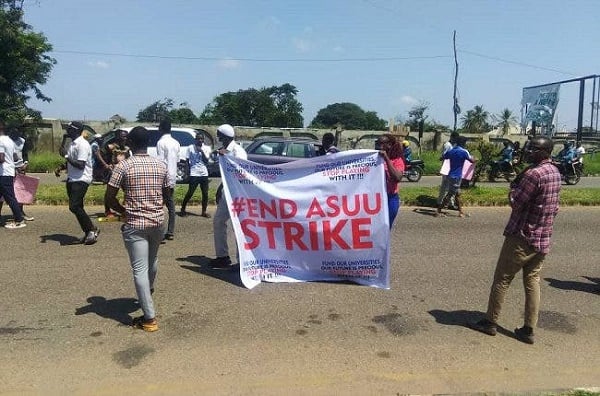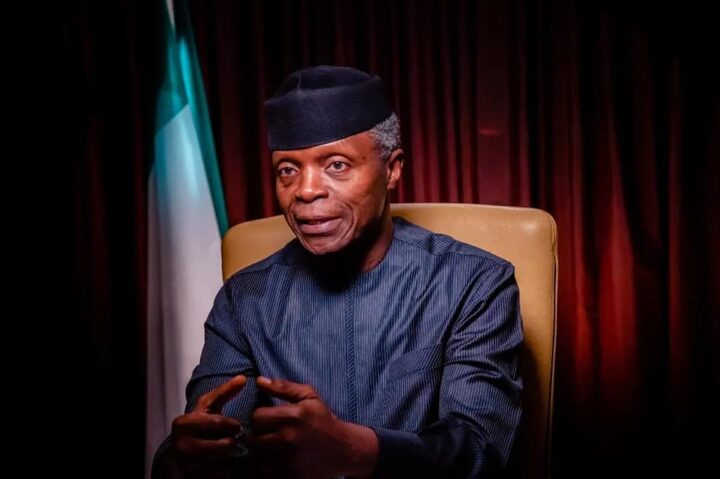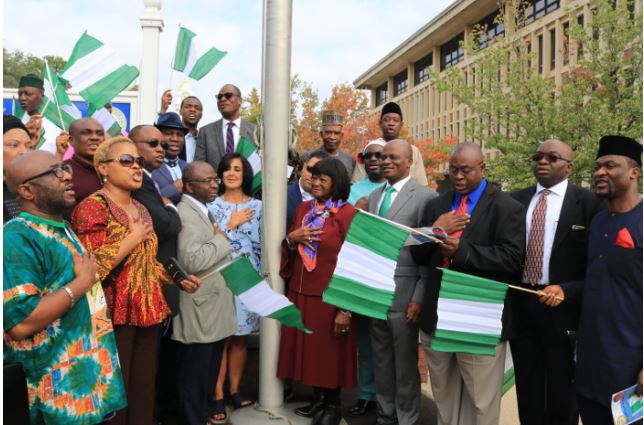TIMELINE: 4 years and still counting… how ASUU strike has affected students since 1999
In his first official reaction to the ongoing strike by Nigeria’s academic body, Education Minister Adamu Adamu, stunned some of us when he said he was looking for the Academic Staff Union of Universities (ASUU).
Initially, I didn’t get what the minister was trying to say. Looking for ASUU? Why? Until he said ASUU’s decision to embark on strike came abruptly amidst ongoing negotiations. According to him, “ASUU, unfortunately, they have gone on strike and I am looking for them because all the issues are being addressed.”
Well, even at that, only the minister knows what he meant by ASUU going on strike “abruptly”. Those of us outside government weren’t taken aback by ASUU simply because the prospect of the strike was something that loomed large. We knew the union gave a three-month notice. As far back as November 17, 2021, the union had told us that it would embark on another strike if the federal government continued to renege on the 2020 agreement with it.
Then, the Minister of Labour, Chris Ngige, had boasted that there would be no strike. He said government would meet the union’s demands. In the same vein, President Muhammadu Buhari promised to fulfil government’s agreement with ASUU. By the time the union declared a work-free day on February 7 to sensitise the students and Nigerians about an impending strike, it was obvious that the strike would commence except the Nigerian government was able to pull a magic.
Advertisement
So, the strike is not abrupt in any way. The government had enough time to reach an agreement with the union if it had wanted to. Unfortunately, another long winding academic hiatus has just begun. No one knows when this would end. ASUU has told us that it is a rollover strike. What this means is that the strike will be rolled over until government meets its demands. Some people have expressed fears that if ASUU’s one-week indefinite strike could paralyse academic activities for nine months in 2020, for how long will the universities be locked with a one-month warning strike. Well, time will tell.
I don’t know how effective this strike would be. I am assuming the results won’t be different from previous exercises. The union went on six months strike in 2013; in 2014, it embarked on a week strike; in 2017, it went on another strike that lasted 36 days; in 2020, it went on a nine-month strike. The list of strikes is endless. Yet, the reasons for the actions are still there.
I doubt if government would listen to the lecturers this time around, and if it does, it is likely to sign another agreement that will not be implemented and the lecturers will embark on another strike again. So, the cycle of strikes is likely to continue.
Advertisement
ASUU will tell anyone that cares to listen that reaching agreement with the Federal Government is always a frustrating journey. At the same time, the federal government has said that it is always interested in peaceful resolutions. But according to the education minister, “The federal government is ready to meet them on all issues they have raised and if there are so many meetings and the gap is not closing, then I think it’s not the fault of the government.” Simply put, there are many areas of disagreement between ASUU and government. So, what we are likely to continue to see is an unending negotiation, with government reneging on agreements from time to time.
I pity the students. It took some of them years to gain admission because of the problem of oversubscription in public universities and other factors like quota system. By the time some of them leave school (those who eventually do, because some may never go back) finding job may be difficult. They would have passed the average age that employers are looking for. Employers often peg their recruitment age at between 25 and 30 for fresh graduates. This complicates issues for them.
Meanwhile, ASUU always refers to a certain 2009 agreement anytime it goes on strike. It also references another 2001 agreement that gave birth to the 2009 agreement. While I may not be able to provide the details of these agreements here, there are certain recurrent issues in ASUU agitations. These include the demand on the revitalisation of public universities, earned academic allowances, funding, autonomy, and of recent, the demand for the University Transparency Accountability Solution (UTAS) as a replacement for the Integrated Payroll and Personnel information system (IPPIS).
Similarly, a copy of the draft agreement between the Federal Government and ASUU in 2009 had as part of its terms of reference the following: To reverse the decay in the university system in order to reposition it for greater responsibilities in national development; to reverse the brain drain, not only by enhancing the remuneration of academic staff but also by disengaging them from encumbrance of a unified civil service wage structure; to restore Nigerian universities through immediate, massive and sustained financial intervention and to ensure genuine university autonomy and academic freedom.
Advertisement
To revitalise public universities, it was agreed that all federal universities require over one trillion Naira, specifically, one trillion, five hundred and eighteen billion, three hundred and thirty-one million and five hundred and forty-five thousand Naira (N1,518,331,545) between 2009 and 2011 and sustain the intervention continuously. This has been the crux of the matter. The federal government has failed to inject this money into the federal universities. And I doubt if it will ever do. So, sustainability is out of it.
Give it to the ASUU. The few developments in Nigeria’s higher institutions today are some of the products of its agitations. For instance, the union’s fight led to funding interventions from bodies like TETFUND, which intervenes in the area of research, scholarship and infrastructure in many public institutions. I visited the Federal Polytechnic, Ilaro in Ogun State last year and nearly all the new structures on the campus were built by TETFUND. The same thing is happening across the country in public institutions.
I am also aware that a lot of lecturers are studying abroad while some have finished their studies, all on TETFUND scholarships. Intervention in the area of research has also improved over the years though still grossly inadequate. The only sad part of this story is that many of the people sent abroad to study go back there because the local system keeps frustrating them. I once gave the example of one of such lecturers in one of my past articles. He had to buy a generator and an interactive white board with his money just to be able to teach the students. He still got frustrated in the process and went back abroad. There are many people like that. I have written about lecturers contributing money to embark on research in our universities.
So, the question is, who is the ultimate beneficiary of the so-called scholarships for the few lecturers that are able to benefit from these government interventions? The foreign nations — they not only collect our money as tuition, they also take away our intellectuals. They gained all the way. Who has bewitched Nigeria?
Advertisement
Absolutely, but for ASUU, the decay we see in our university system now would have been much more. And for those who think Nigerian lecturers are well remunerated, they need to know that the monthly salary of a senior lecturer with a PhD is just around N222,229 per month. The take-home is far less. One of Nigeria’s prominent professors with a great deal of exposure and experience once showed me his pay slip. He was on the last step in the professorial cadre having been a full professor for close to 25 years, yet his full salary was around N500,000. His take-home was lower than that. How do you want to attract people to teaching in situations like this?
This notwithstanding, I don’t see the Nigerian government performing any magic in terms of financial interventions in our university system to the level that ASUU is asking for. Apart from the fact that the country is broke, it is spendthrift. ASUU can go on strike forever, it won’t get all the things the Nigerian government had committed itself to doing. So, where do we go from here? Should we just continue to lament, complain and allow academic activities to be paralysed all the time?
Advertisement
Obviously, we can no longer continue to run a free university system. The earlier we woke up to this reality, the better it would be for all of us. I have made this point before. If we truly yearn for world class universities, we must be ready to do what it takes to get a world class education. There is no place in the world where university education is cheap. The Nigerian government should either adequately fund our university system or introduce tuition gradually.
When parents pay, they will demand more accountability. The universities will be forced to develop a robust governance system that makes for greater accountability and transparency. Government can make special provisions for the poor and the indigent but to think we could sustain a free university system with the current level of government funding is an illusion.
Advertisement
In doing this, government should take responsibility and stop blackmailing ASUU. Now the FG has said it wanted to introduce N300,000 tuition and that ASUU kicked against it. In other words, ASUU is the problem. Remember, the last time, ASUU said government was considering N1 million tuition which is ridiculous. A tuition of N300,000 is too much for a start. An average public university has more than 20,000 students. The University of Nigeria, Nsukka, has an estimated population of 36,000, according to Wikipedia; University of Ibadan, 35,000 and Ahmadu Bello University, 32,000. Imagine collecting N300,000 from each of these students? That is huge. Start little by little. And as for ASUU, I think it has to soften its hard stand on tuition. In any case, you can’t dictate to your employer how it should run its business once it fulfils its obligations to you.
The only justification for ASUU strikes over the years is the non-implementation of signed agreements. However, more money in the system via tuition may turn things around. Otherwise, strike continues!
Advertisement
Olabisi Deji-Folutile (PhD) is the editor-in-chief, franktalknow.com, and member, Nigerian Guild of Editors. Email: [email protected]
Views expressed by contributors are strictly personal and not of TheCable.
1 comments







i dont blame asuu for tuition, if tuition of three hundred thousand is introduced at any point, how many people do you think can pay, some people struggle to eat even at school, the truth is the Nigerian Government has Failed is all aspects